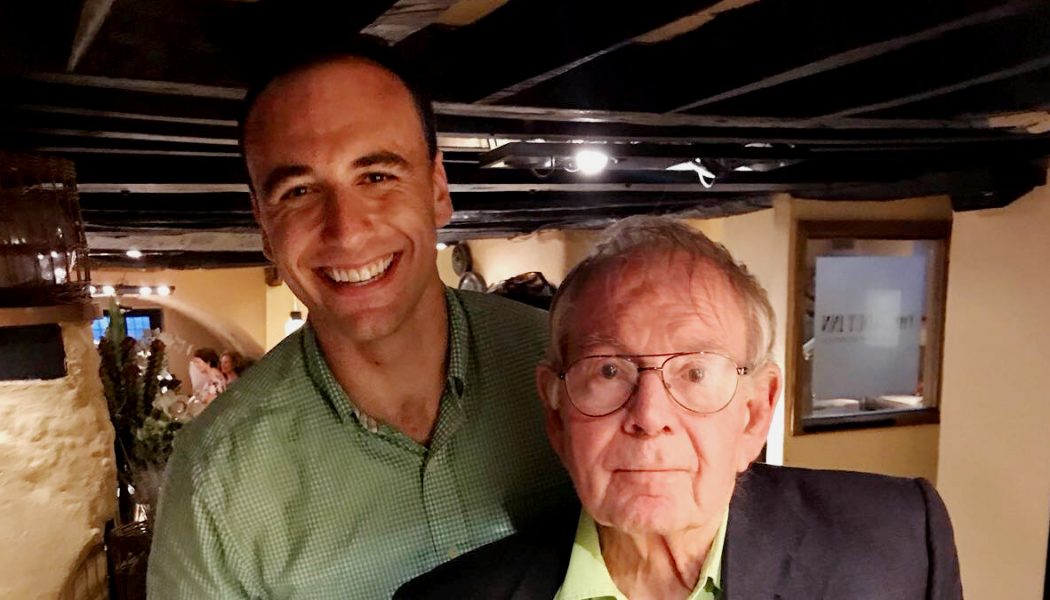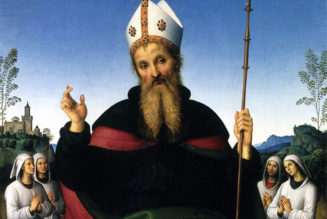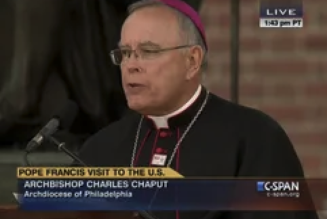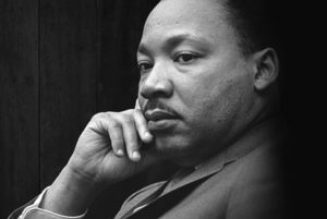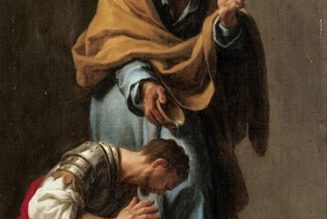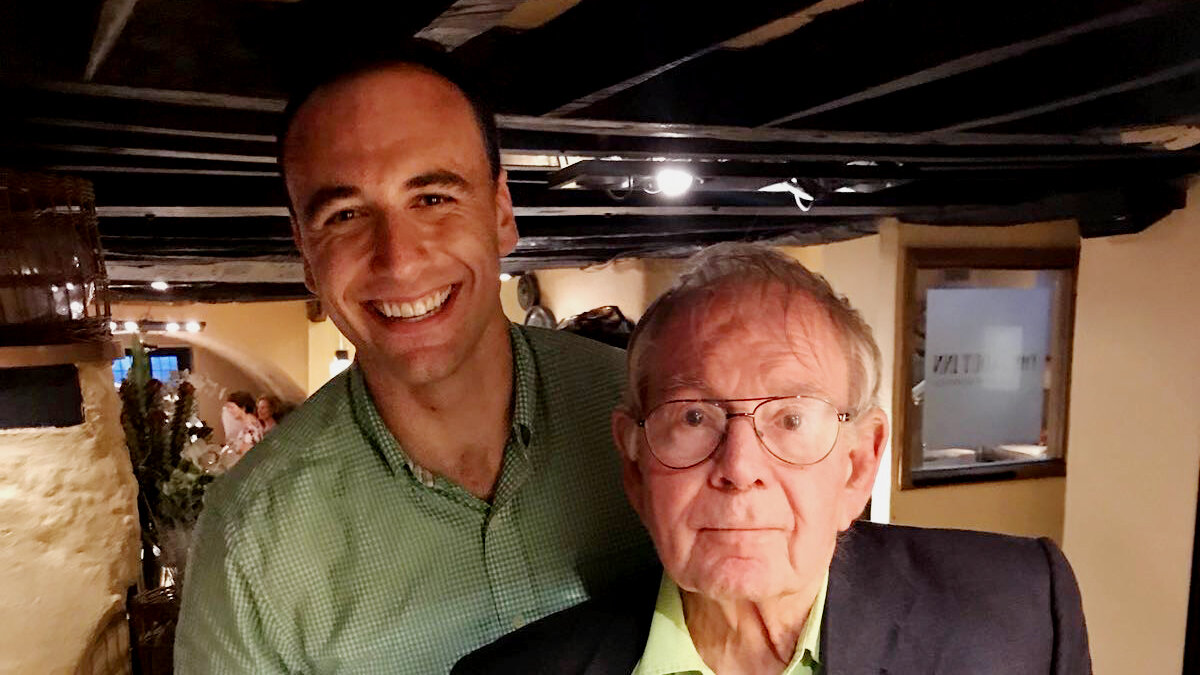
And I smile to think
How God’s completeness
Flowed round my incompleteness
Round my restlessness
His Rest.
– Walter’s Desired Epitaph
When I was a junior in undergraduate, I went off to Oxford for a term abroad. It was early January and the August or September prior I had begun catechesis to enter the Catholic Church. Now, having travelled in the middle of it, I was keen to find a good priest to prepare me.
The day after I arrived, I happened to pass by the Oxford Oratory, where, as a small sign on its gates boasts, St John Henry Newman had preached, Gerard Manley Hopkins was a priest, and J.R.R. Tolkien a regular. Another sign listed Mass at 10.00a on Saturday, so I planned to go the next day.
After that morning Mass, I looked around for a man in a collar and saw one talking to an old man in the back. Standing several feet off, I tried to give them their space but (as a poor hider) they beckoned me over, and I explained my situation to the priest.
“Oh, I’m not actually the person you need to see,” said the collared man.
“No,” said the old man pointing at his interlocutor, “he’s not the priest, but the bishop!” (Perhaps I was too fresh a catechumen to notice, but I don’t remember seeing any purple or a pectoral cross.)
To distract from this newfound attention, the bishop replied, “Well, this is the man of Oxford: this is Walter Hooper!”
Walter Hooper, secretary and the long time literary executor of C.S. Lewis, died today in Oxford at the age of 89. Born in Reidsville, NC, Walter grew up in the American south, though he lived the last 57 years of his life in Oxford, England. It all began when he wrote Lewis a letter thanking him for his book Miracles. In the letter, he used the analogy of Tom and Becky lost in a cave in The Adventures of Tom Sawyer to describe how he felt lost in the Christian faith. And then, the light! That was Miracles for Walter — a source of hope, relief, and joy, and a promise, perhaps even evidence of, a life beyond his present darkness. To Walter’s surprise, he received a response:
Dear Mr. Hooper,
Thank you for your kind letter of the 23rd. I am glad if I have been the instrument of Our Lord’s help to you: in His hands almost any instrument will do, otherwise none.
We should, I believe, distrust states of mind which turn our attention upon ourselves. Even at our sins we should look no longer than is necessary to know and to repent them: and our virtues or progress (if any) are certainly a dangerous object of contemplation. When the sun is vertically above a man he casts no shadow: similarly when we have come to the Divine meridian our spiritual shadow (that is, our consciousness of self) will vanish. One will thus in a sense be almost nothing: a room to be filled by God and our blessed fellow creatures, who in their turn are rooms we help to fill. But how far one is from this at present!
With all good wishes.
Yours sincerely
C.S. Lewis
Their letters back and forth continued for nine years until Walter took a trip to England. He arranged for a visit with Lewis and after a lovely afternoon together, which has been marvelously told by Walter in many interviews, Walter hopped on board a bus, profusely thanking the great don for taking the time to visit with him.
But Lewis was not done with Walter: “You’re not getting away,” Lewis responded, “You’re coming to the Inkling’s meeting on Monday.” Walter wasn’t done with me, either. He took me under his wing, as he did with so many young men, taught me to pray the Mass (often too loudly, much to the chagrin of our friends around us), and ultimately became my godfather as I was received into the Catholic Church.
I hope others will list Walter’s literary accomplishments and praise his work as a Lewis scholar and archivist, through which he returned the great apologist to print after bookstores had removed Lewis from their shelves. But it was his quiet, constant piety and his deep love of Jesus in the Holy Eucharist that impressed me and all those who came to know him as the man in the front-left pew of the Oxford Oratory. Up until my reception day in April 2015, we attended daily Mass together in that usual seat. The routine was always the same. He would get there thirty minutes early to pray his rosary. I would show up ten minutes early to distract Walter from his rosary. I’d sit down next to him, give him a side hug, and he’d ask: “Well, how are you today?” But the day I was confirmed, I arrived earlier. When he came over to the pew, he ceremoniously set down his bag, stood straight up, and looked intently at me, saying, “This is the greatest thing you have ever done; this is the greatest thing you have ever done.” He had no time for inane questions such as, “Are you ready?” or “How are you feeling?” He knew that the cosmos was Catholic and there was no way around it; that we are to focus our sights on the Eucharist and beckon others to gaze with us. He lived out Lewis’ conviction: “I believe in Christianity as I believe the Sun has risen, not only because I see it but because by it I see everything else.”
Three weeks ago I accompanied Walter to the hospital for a minor operation in a regulated hospice vehicle. As he was locked-down since March, first in his home and then in a nursing home, he had received the Blessed Host but once in those eight months. A marvelous Franciscan permitted me to bring him the Sacrament that day. At this point, Walter could barely communicate and struggled to understand most of what people were saying. But as soon as I revealed the pyx (the golden vessel in which the Eucharist was held), he gasped and began shaking. Even when he recognized, remembered, and understood little else, Walter knew his Lord.
For anyone who has met or heard Walter give a talk, they’ll know what a marvelous storyteller he was. Perhaps the most well-known story that Walter told was of his first meeting with C.S. Lewis; it was also the first story that Walter told me. We were having tea when he said, “You know, Lewis and I drank three pots of tea the afternoon we met. And after that, well, I needed to go somewhere.” And he began to narrate:
‘I’m sorry, Mr. Lewis, but would you mind if I used your bathroom?’ At that time in England, the bathroom was often separated from the toilet. So Lewis took me over to the closet where he found four or five towels and five or six bars of soap and showed me to the bathroom.
‘Will this be sufficient for your bath,’ Lewis asked me; and I, shell-shocked at only seeing a bathtub in the room, spluttered, ‘yes!’
‘Well,’ said Lewis, ‘you have had a very long journey; take your time, I’ll be in the next room reading.’
So there I was, standing with all of these towels and all of these bars of soap and saying to myself: ‘I cannot do that to Mr. Lewis’ bathtub.’
Anyways, I did end up returning to his common room and sheepishly saying, ‘It wasn’t actually the bathroom I needed.’
Lewis laughed, slapped his leg, and chortled: ‘That will teach you Americans to stop using your euphemisms; now what is it that you need?’”
There is also the story of meeting Pope Saint John Paul II. Walter had been contacted by the office of the Bishop of Krakow in the late 1960s with a request to translate Lewis into Polish. (Against the wishes of the estate, but knowing what good would be done with it, Walter gave permission immediately.) So when the same Bishop was named Pope John Paul II a few years later, Walter was keen to meet him.
In 1984, Walter was still an Anglican, and a priest at that. He was also struggling with an anxiety that he described as an “acute pain.” Despite his Anglicanism, he had a strong conviction that if he could only touch the vicar of Christ, as the bleeding woman of the Gospel of Mark touched Christ’s garments, he would be healed. He narrated:
I had a visit from a priest who had been in Rome writing his thesis on C.S. Lewis. He knew how much I admired the Holy Father, and he also knew how much the Holy Father admired C.S. Lewis’s writings. Soon after that he wrote to me — and I think it was his phraseology that I didn’t take seriously — he said something like, “Do you have time, perhaps, to come to have a chat with the Holy Father?” Well, I never answered that question. I didn’t think it was a real question, I thought he was just being nice. Anyway, he wrote back after a couple of weeks saying, “Look, I know you’re very busy, but so is the pope. Couldn’t you spare just a few minutes with the Holy Father?” So I rang the priest and said, “My goodness! I didn’t realize you meant that seriously! I’ll come at any time.”
But when he appeared and I did touch him the pain was taken straight away — just straight away. And he looked pained as if it was transferred to him. “I’m sorry, Holy Father, I hadn’t realized that would happen,” to which he replied, “No, that’s quite all right, that’s quite all right.”
Anyway, we talked about Lewis for some time, primarily the Four Loves, which the pope loved. At the end of the conversation the pope exclaimed, “C.S. Lewis knew what his apostolate was.” And I thought for a second, ‘Should I respond?’ but then the pope’s roaring voice roared again: “And he did it!” [Walter would smack a neighboring table at this point whenever he told this story.] This second line made all the difference in the world: It is one thing to know your apostolate and another thing to do it.
Early this morning when we learned that Walter’s health was quickly declining, our mutual friend and Walter’s good doctor wrote: “While Walter never said this about himself, I am quite certain that Walter also knew his apostolate and he did it.” I couldn’t agree more. Austin Farrer, the warden of Keble College, Oxford, told Walter something similar when he was considering returning to the UK after Lewis’ death and taking up the post of Literary Executor. Farrer said, “There is a work for you to do.” Walter was always specific: there was not work to do, but a work; a particular calling, an apostolate. And he did it: he kept Lewis’ works in print, spread the popularity of the great apologist and writer, and so served as an unknown midwife of an untold number of baptisms inspired by Lewis’ marvelous apologia for the Christian faith, while taking on nearly fifty godchildren/sponsees of his own.
In the past few years of Walter’s life, after his first stroke, he slowly lost his ability to articulate himself freely and beautifully; he struggled to find the right words; he would forget the next line of stories he had told thousands of times; he struggled, he thought, to fulfill his apostolate. His beautiful gift of storytelling—by which Walter blessed others—was snatched back from him. He became easily irritable, as a deep characteristic of his own identity was stripped from him. I do not know what ultimately enabled him to pivot from anger and toward peace—but he did. His turbulence settled in the tranquility of God.
Like most celebrities, there was a scandal around Walter’s name: a woman named Kathryn Lindskoog claimed that Walter had forged certain writings of C.S. Lewis to increase his publications. Unlike most accusations, there was not a pinch of truth to it. No Lewis scholar worthy of the title believed it for a second; few if any in Oxford ever did; certainly none today. But for well over a decade Walter suffered slander at the hand of Lindskoog. Our friend Michael Ward was the first to tell Walter of her death in 2003. Michael tells the story that the first reaction Walter had was to cross himself and pray she may Rest In Peace. Walter then prayed a rosary for her soul every day for the next seven days, a model of praying for those who hate you.
Walter often bemoaned the state of our society. After being ridiculed by a student he taught sometime in the 1950s for not knowing who the vice president of the United States was, he subscribed to Time Magazine and many others. But as the good Catholic that he was, Walter knew the solution could not come through any policy changes. I would often cite certain ideas. He seemed happy to hear them, but always came back to the need for conversion to Christ as what would redeem our culture. He was following his great mentor: Lewis wrote in Mere Christianity, “A Christian society is not going to arrive until most of us really want it: and we are not going to want it until we become fully Christian.” Walter was fully Christian. If we will ever revive new Christian polities, it will require such great souls as that of Walter Hooper.
Requiem aeternam dona ei, Domine, et lux perpetua luceat ei. Requiescat in pace.
Join Our Telegram Group : Salvation & Prosperity
